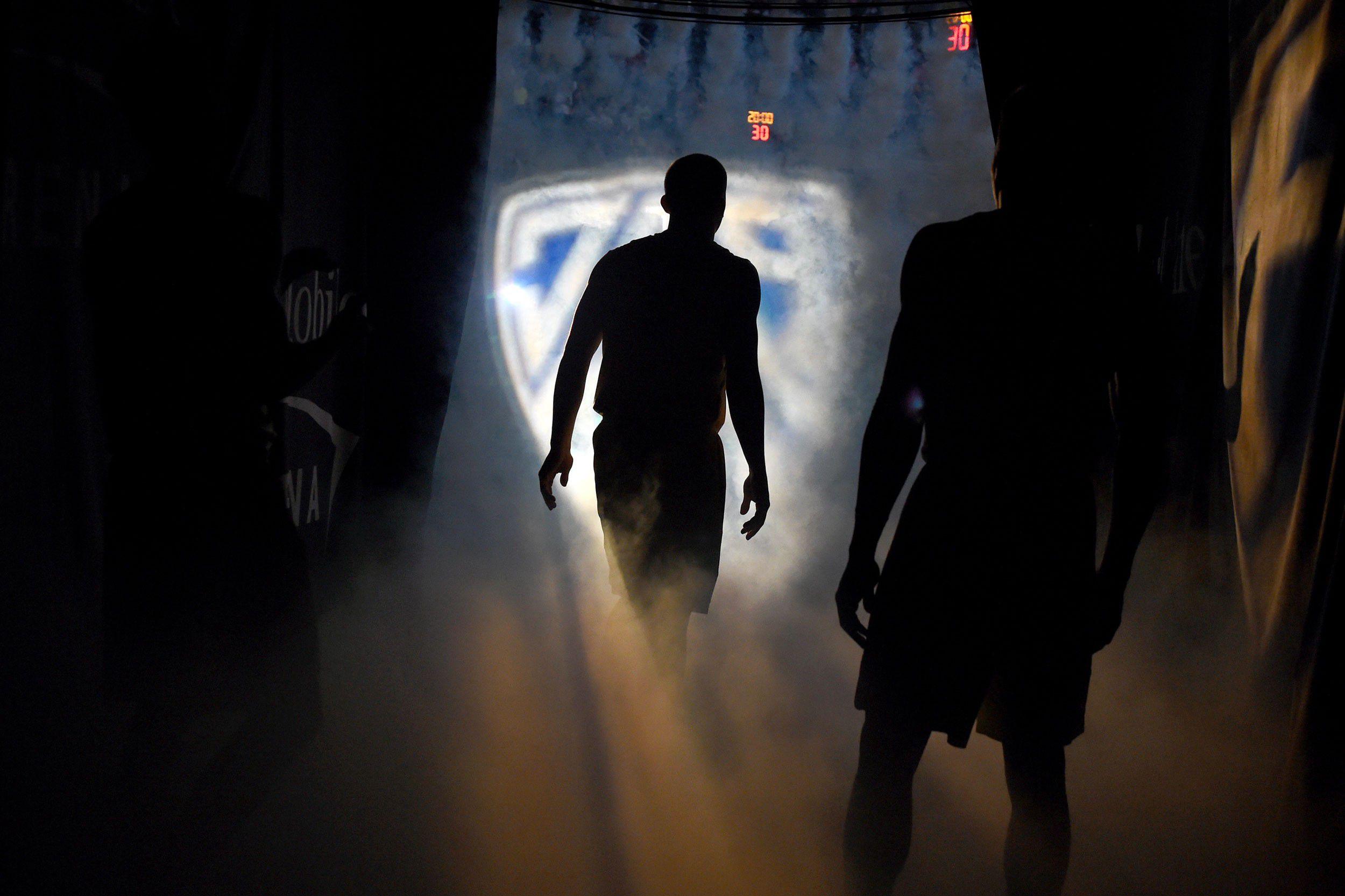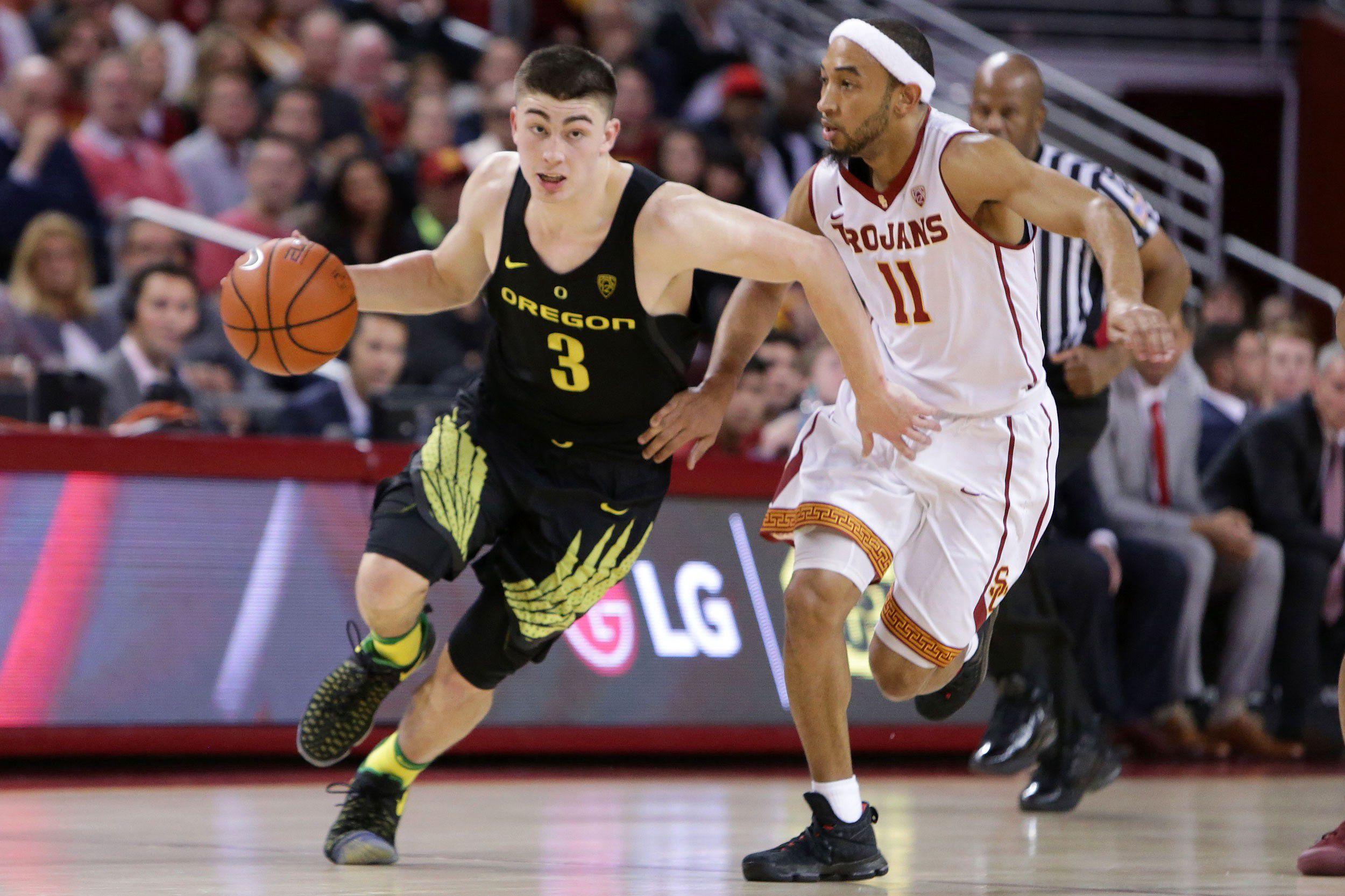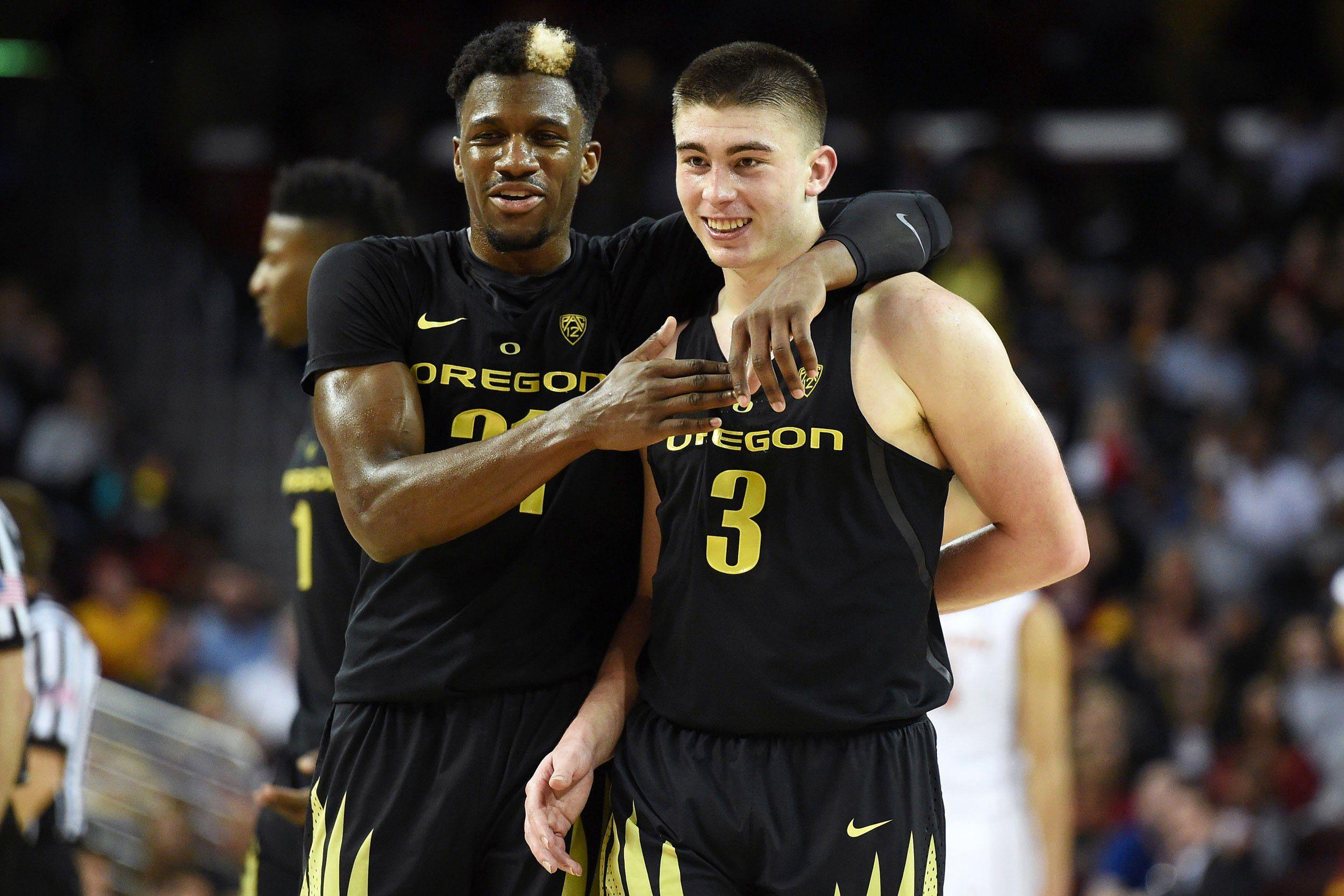Minutes before walking through a stream of smoke and being introduced to the crowd at T-Mobile Arena in Las Vegas, Oregon point guard Payton Pritchard looked down at his outfit and realized he was wearing the wrong thing. The other four members of the Ducks starting five were getting ready to run out of the tunnel in their jerseys, and as flashing lights illuminated the dark space, junior forward Dillon Brooks turned toward the 6-foot-2, 200-pounder and asked why he was still in his warmup. Pritchard, the lone freshman of the group, wasn’t sure.
Jordan Bell, the team’s junior forward, stepped out into the arena and shouted to the bench to see if someone could retrieve Pritchard’s shirt. No luck. Bell then turned to a floor assistant and asked if she could take it.

Slightly embarrassed by the mishap, Pritchard removed his warmup and quickly handed it over. The 19-year-old from West Linn, Oregon, proceeded to score eight points, corral six rebounds, and dish out three assists in 29 minutes of action, helping the Ducks dispatch Arizona State 80–57 in last Thursday’s first round of the Pac-12 tournament. All three assists came in the second half, helping Oregon outscore the Sun Devils by 20 in the frame.
“We [were] like, ‘Yo, take your warmup off!’” redshirt senior guard Dylan Ennis says of the pregame mixup. “We’ve been here before. He hasn’t. It’s little things like that remind us that he’s just a freshman.”
Oregon’s ultra-athletic starting lineup includes four upperclassmen. It boasts the ability to score in bunches, and it defends in a manner that regularly suffocates the opposition, as it ranks second in the Pac-12 in adjusted defensive efficiency, according to KenPom. Throughout their 29–5 campaign, the Ducks have relied on a group of seasoned veterans, one of whom, senior forward Chris Boucher, was lost last week to a season-ending torn left ACL injury. Yet as Oregon enters this year’s tournament and aims to build upon last year’s Elite Eight loss to Oklahoma, the program is ready to let its freshman point guard guide the way.
“[Pritchard] is like six, seven years younger than me, which is crazy, but on the court, he’s so mature on every level,” Ennis says. “We don’t have a freshman point guard. We have a guy who is way beyond his years.”

Pritchard arrived in Eugene as the local kid on a team that otherwise lacked one. Throughout his recruiting process at West Linn High School, he had drawn interest from UCLA and Villanova, but neither program offered him a scholarship. Florida State and Oklahoma did, and in November 2014 Pritchard gave a verbal pledge to the Sooners. He decommitted in July of the following year, and nearly two months later decided that he wanted to play for a school located less than two hours away from his hometown. “Being close to family was a big,” Pritchard says. “I just thought [Oregon] was a good fit.”

The national scene may not have heard much of Pritchard as he made the flip from Oklahoma to Oregon; he was the 54th-rated overall player and the ninth-rated point guard in his class, according to the 247Sports composite rankings. In local circles, however, Pritchard was widely regarded as a high school legend. By the time he committed to the Ducks, Pritchard had already led West Linn to three consecutive Class 6A state championships, winning player of the year honors in two of those seasons. During his senior campaign, he averaged 23.6 points, 5.1 rebounds, 6.8 assists, and 3.1 steals per game. West Linn won its fourth straight state title game in March 2016, with Pritchard amassing 25 points, 12 rebounds, and six assists. He left for college with a blissful ignorance of what it felt like to lose in a big game.
Upon arriving in Eugene, Pritchard was ready to be flexible with his role, to start every game or play limited minutes off the bench. “I wasn’t coming in expecting anything,” he says. But as the first few team sessions unfolded, his teammates noticed that Pritchard’s work ethic and drive far outweighed his lack of experience.
“Playing against him in practice, we knew he was going to have an impact,” junior guard Casey Benson recalls. “He was so confident with the ball.” Says Brooks: “Payton is a bulldog. I knew from the moment he came on campus he was going to be really good.”
Pritchard started the team’s 2016–17 opener against Army, totaling 15 points and four assists in a 91–77 win. Over the course of the season, he had scoring spikes of 19, 18, and 17 points, respectively, and of head coach Dana Altman’s 10 most-used lineups, he’s part of all but three. Pritchard is most valuable to this offense as its conductor — he averages 7.7 points, 3.9 assists, and 3.3 rebounds per game — but that doesn’t mean he can’t become the Ducks’ headliner when it matters most. “He’s a different point guard,” Brooks explains. “People look at him as a typical white boy, but he’s not.”
The best example of what Pritchard is capable of came in Oregon’s 89–87 win over UCLA in late December. With the Ducks trailing by eight points and less than three and a half minutes remaining, he made a series of plays that lifted the team to victory. First, he assisted a Boucher 3-pointer on a perfectly run pick-and-pop play that cut the lead to five. On the next possession, he kept the ball tethered to his hand, weaved in between the Bruins defenders, and sunk a layup over the outstretched arms of Thomas Welch to bring Oregon within two. After UCLA answered by extending the lead to four with just 15 seconds left, Pritchard — who handles every out-of-bounds play out for the Ducks — passed the ball into Brooks and sprinted behind the 3-point line. Brooks delivered a return pass and Pritchard stepped back and drained a deep shot to slice the deficit to one.
Brooks eventually hit the buzzer-beating 3 to win that game, overshadowing the freshman’s impact in setting the stage for that moment. The junior, however, never forgot Pritchard’s part in the comeback. To Brooks, it was enough to dispel the notion that Pritchard was merely a point guard who could run the offense and limit mistakes; rather, he was a playmaker who could morph into a secret weapon come March.
“That’s when he proved it,” Brooks says. “Hitting that big shot against UCLA that brought us close. … He makes big plays while also handling our offense.”

Pritchard’s rise into the the limelight hasn’t relieved him of his status as a newcomer. As Oregon arrived in Las Vegas for the Pac-12 tournament last Wednesday, Brooks caught one glimpse of Pritchard’s head — and his freshly buzzed trim — and decided to take matters into his own hands. “His haircut was terrible,” Brooks says. “I had to take care of my freshman. We can’t have him looking like that in his first tournament on national television.”
Brooks played high school ball 16 miles southeast of Vegas in Henderson, Nevada, so he called up his personal barber and asked him to drive to the Ducks’ hotel shortly before the team’s curfew. Pritchard emerged from his makeshift barbershop with a cut that was cleaner than his jump shot. “It was fine,” Ennis says of Pritchard’s original cut, with a laugh. “But the barber didn’t shape him up right. His fade was off.”

Pritchard’s haircut might be the only thing that’s been off during his impressive freshman season. And starting with the no. 3 seed Ducks’ matchup with no. 14 seed Iona on Friday afternoon, he’ll look to keep that trend going by leading Oregon through the loaded Midwest region of the bracket. Playing nearly 30 minutes per game, he’s become integral to the Ducks’ flow. “When we’re starting to go, he knows how to get in the lane, pitch out, but he can also hit an open 3,” Ennis says. “We love having him back there at point.”
Oregon’s length and athleticism are no secrets. The Ducks swarm opposing offenses and are able to contain as well as they can score. The thing they don’t do, though, is run. Oregon ranks 238th in the country in adjusted tempo, per KenPom, and averages just 66.4 possessions per game. Yet it somehow scores 117.7 points per 100 possessions.
In Eugene, neither speed nor strength is the name of the game. Efficiency is. And that’s where Pritchard can lift this squad to a higher level. “He’s a sponge,” Brooks says. “He’s learning from every guy. This is a veteran group and he’s learning from every player. I’m glad he’s my point guard.”
In 2017, the Ducks are as balanced as they are deep. They rank in the top 22 in offensive and defensive efficiency, according to KenPom. Perhaps more crucially, they feature a trait that’s imperative to a deep March Madness run: strong guard play. Analysts have long noted how having a guard who’s as dynamic as he is dependable can go a long way toward determining tourney success; despite his youth, Oregon has one in Pritchard.
Last year, the onetime Oklahoma commit watched from home as the Ducks lost to the Sooners in the Elite Eight. This March, he could be the difference Oregon needs to ensure an exit before the Final Four doesn’t happen again.